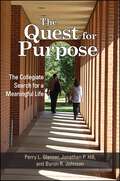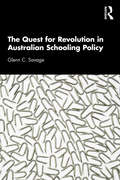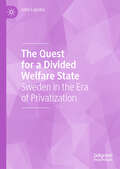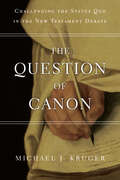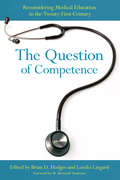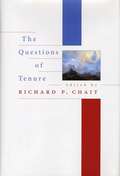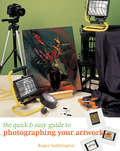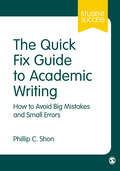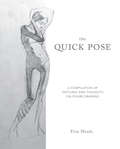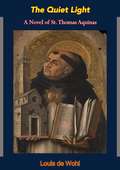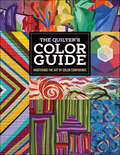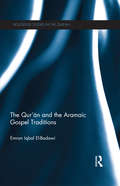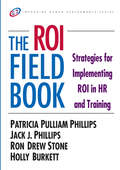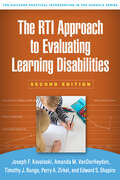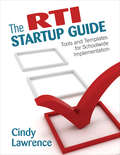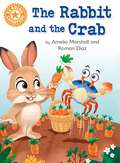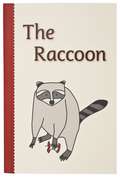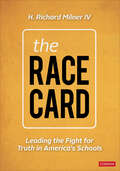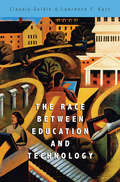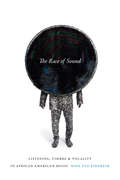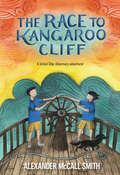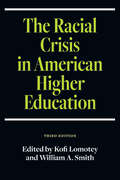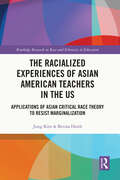- Table View
- List View
The Quest for Purpose: The Collegiate Search for a Meaningful Life
by Perry L. Glanzer Byron R. Johnson Jonathan P. HillWhile the search for meaning and purpose appears to be a constant throughout human history, there are characteristics about our current time period that make this search different from any other previous time, particularly for college students. In this book, Perry L. Glanzer, Jonathan P. Hill, and Byron R. Johnson explore college students' search for meaning and purpose and the role that higher education plays. To shed empirical light on this complex issue, the authors draw on in-depth interviews with four hundred college students from different types of institutions across the United States. They also analyze three sets of national survey data: the National Study of Youth and Religion, College Students Beliefs and Values, and their own Gallup-conducted survey of 2,500 college students. Their research identifies important social, educational, and cultural influences that shape students' quests and the answers they find. Arguing against a utilitarian view of education, Glanzer, Hill, and Johnson conclude that colleges and universities can and should cultivate and aid students in their journeys, and they offer suggestions for doing so.
The Quest for Revolution in Australian Schooling Policy
by Glenn C. SavageThis book seeks to critically examine the impacts of ‘grand designs’ in public policy through a detailed historical analysis of Australian schooling reforms since the ‘education revolution’ agenda was introduced by the federal government in the late 2000s. Combining policy analyses and interviews with senior policy makers and ministerial advisors centrally involved in the reforms, it offers a detailed interpretive analysis of the complexities of policy evolution and assemblage. The book argues that the education revolution sought to impose a new order on Australian schooling by aligning state and territory systems to common policies and processes in areas including curriculum, assessment, funding, reporting and teaching. Using a theory and critique of ‘alignment thinking’ in public policy, Savage shows how the education revolution and subsequent reforms have been underpinned by uncritical faith in the power of nationally aligned data, evidence and standards to improve policies and unite systems around practices ‘proven to work’. The result is a new national policy assemblage that has deeply reshaped the making and doing of schooling policy in the nation, generating complex questions about who is steering the ship of education into the future. The Quest for Revolution in Australian Schooling Policy is a must read for education policy researchers, policy makers, education ministers and school leaders, and will appeal to anyone with an interest in the complex power dynamics that underpin schooling reforms.
The Quest for a Divided Welfare State: Sweden in the Era of Privatization
by John LapidusThis book deals with the quest for a divided welfare state in Sweden. The prime example is the rapid rise of private health insurance, which now constitutes a parallel system characterized by state subsidies for some and not for others. This functions as a kind of reverse means-testing, whereby primarily the upper classes get state support for new types of welfare consumption. Innovatively, Lapidus explains how such a parallel system requires not only direct and statutory state support but also indirect support, for example, from infrastructure built for the public health system. He goes on to examine how semi-private welfare funding is dependent on private provision and how the so-called 'hidden welfare state' gradually erodes the visible and former universal welfare state model, in direct contrast to its own stated goals. Who benefits from privatized welfare? How are the privatization of delivery and the privatization of funding linked? How does this impact public willingness to pay tax? All of these questions and more are discussed in this accessible volume.
The Question of Canon: Challenging the Status Quo in the New Testament Debate
by Michael J. Kruger2013 Preaching Survey of the Year's Best Books for PreachersPreaching's Preacher's Guide to the Best Bible Reference for 2014 (New Testament General) Did the New Testament canon arise naturally from within the early Christian faith? Were the books written as Scripture, or did they become Scripture by a decision of the second-century church? Why did early Christians have a canon at all? These are the types of questions that led Michael J. Kruger to pick apart modern scholarship?s dominant view that the New Testament is a late creation of the church imposed on books originally written for another purpose. Calling into question this commonly held "extrinsic" view, Kruger here tackles the five most prevalent objections to the classic understanding of a quickly emerging, self-authenticating collection of authoritative scriptures. Already a noted author on the subject of the New Testament canon, Kruger addresses foundational and paradigmatic assumptions of the extrinsic model as he provides powerful rebuttals and further support for the classic, "intrinsic" view. This framework recognizes the canon as the product of internal forces evolving out of the historical essence of Christianity, not a development retroactively imposed by the church upon books written hundreds of years before. Unlike many books written on the emergence of the New Testament canon that ask "when?" or "how?" Kruger focuses this work on the "why?"—exposing weaknesses in the five major tenets of the extrinsic model as he goes. While The Question of Canon scrutinizes today?s popular scholastic view, it also offers an alternative concept to lay a better empirical foundation for biblical canon studies.
The Question of Competence: Reconsidering Medical Education in the Twenty-First Century
by M. Brownell Anderson Brian D. Hodges Lorelei LingardMedical competence is a hot topic surrounded by much controversy about how to define competency, how to teach it, and how to measure it. While some debate the pros and cons of competence-based medical education and others explain how to achieve various competencies, the authors of the seven chapters in The Question of Competence offer something very different. They critique the very notion of competence itself and attend to how it has shaped what we pay attention to-and what we ignore-in the education and assessment of medical trainees.Two leading figures in the field of medical education, Brian D. Hodges and Lorelei Lingard, draw together colleagues from the United States, Canada, and the Netherlands to explore competency from different perspectives, in order to spark thoughtful discussion and debate on the subject. The critical analyses included in the book's chapters cover the role of emotion, the implications of teamwork, interprofessional frameworks, the construction of expertise, new directions for assessment, models of self-regulation, and the concept of mindful practice. The authors juxtapose the idea of competence with other highly valued ideas in medical education such as emotion, cognition and teamwork, drawing new insights about their intersections and implications for one another.
The Questions of Tenure
by Richard P. ChaitTenure is the abortion issue of the academy, igniting arguments and inflaming near-religious passions. To some, tenure is essential to academic freedom and a magnet to recruit and retain top-flight faculty. To others, it is an impediment to professorial accountability and a constraint on institutional flexibility and finances. But beyond anecdote and opinion, what do we really know about how tenure works? In this unique book, Richard Chait and his colleagues offer the results of their research on key empirical questions. Are there circumstances under which faculty might voluntarily relinquish tenure? When might new faculty actually prefer non-tenure track positions? Does the absence of tenure mean the absence of shared governance? Why have some colleges abandoned tenure while others have adopted it? Answers to these and other questions come from careful studies of institutions that mirror the American academy: research universities and liberal arts colleges, including both highly selective and less prestigious schools. Lucid and straightforward, The Questions of Tenure offers vivid pictures of academic subcultures. Chait and his colleagues conclude that context counts so much that no single tenure system exists. Still, since no academic reward carries the cachet of tenure, few institutions will initiate significant changes without either powerful external pressures or persistent demands from new or disgruntled faculty.
The Quick & Easy Guide to Photographing Your Artwork
by Roger SaddingtonShoot your work like a pro!Whether you're entering your paintings in an art show, compiling your portfolio or simply documenting your art, you need flawless pictures of your work. But how do you get professional slides without buying expensive equipment or paying a photographer?With The Quick & Easy Guide to Photographing Your Artwork, you'll learn how to use materials you already own to produce quality slides of your art. Photographer, artist and teacher Roger Saddington shows you:What kind of camera, light and film to use for optimum resultsHow to capture the nature of your work, whether it's two- or three-dimensional or has other unique qualitiesThe best way to set up a studioHow to avoid common problems such as poor framing, camera shake, glare, color casts and more!In The Quick & Easy Guide to Photographing Your Artwork, you'll find all the secrets and surefire methods you need to produce professional, accurate slides and prints of your art.
The Quick Fix Guide to Academic Writing: How to Avoid Big Mistakes and Small Errors (Student Success)
by Phillip C. ShonWhether you’re writing a paper, essay, assignment, or dissertation, this short and punchy book helps you improve your writing skills through minimal effort. Providing you with a quick set of writing rules to follow, this tried and tested guide uses a unique and easy to follow grid-based system. Packed with advice on understanding (big and little) common errors made in academic writing, it helps you identify patterns in your own writing and demonstrates how to reshape or re-evaluate them - and raise your writing game in any academic context. How-to tutorials include: Synthesizing and critiquing literature – and using your coding sheet to develop critical arguments Shaping abstracts, introductions, discussions, and conclusions – to improve the logic and structure of your writing Applying lessons-learned to future projects, whatever format of academic writing. Save time and improve your grades, with this essential quick fix guide! The Student Success series are essential guides for students of all levels. From how to think critically and write great essays to planning your dream career, the Student Success series helps you study smarter and get the best from your time at university.
The Quick Pose: A Compilation of Gestures and Thoughts on Figure Drawing
by Erin MeadsThe foundation of all figurative work is the life study of the human form. Sculptors, painters, and illustrators pull from the process to sharpen their observations, develop better hand-eye coordination, and improve their understanding and interpretation of what they see. Quick Pose: A Compilation of Gestures and Thoughts on Figure Drawing takes a look at the process, presenting first-rate examples and a brief but well-constructed text highlighted by more than 300 illustrations. Author Erin Meads defines the quick pose as figure drawings than can be executed in less than 20 minutes. The majority of images in this book took less than five minutes to draw; their brevity encourages more dynamic poses from the model and challenges the artist to make quick decisions about what to include — and even more significantly, what not to include. Topics include symmetry, foreshortening, light and shadow, drapery, and other essential elements of figure drawing. Artists, art students, art teachers, and anyone who draws will appreciate these well-illustrated insights.
The Quiet Light: A Novel of St. Thomas Aquinas
by Louis WohlThe famous novelist Louis de Wohl presents a stimulating historical novel about the great St. Thomas Aquinas, set against the violent background of the Italy of the Crusades. He tells the intriguing story of St. Thomas who—by taking a vow of poverty and joining the Dominicans—defied his illustrious, prominent family’s ambition for him to have great power in the Church.The battles and Crusades of the 13th century and the ruthlessness of the excommunicated Emperor Frederick II play a big part in the story, but it is Thomas of Aquino who dominates this book. De Wohl succeeds notably in portraying the exceptional quality of this man, a fusion of mighty intellect and childlike simplicity. A pupil of St. Albert the Great, the humble Thomas—through an intense life of study, writing, prayer, preaching and contemplation—ironically rose to become the influential figure of his age, and he later was proclaimed by the Church as the Angelic Doctor.As in all of his novels about great saints of the church, Louis de Wohl weaves an intricate colorful tapestry of love, violence and piety to bring to life a tremendous historical figure and the fascinating period in which he lived.Louis de Wohl was a distinguished and internationally respected Catholic writer whose books on saints have been best-sellers worldwide. Other available titles include Lay Siege to Heaven, Set All Afire and Citadel of God. Sixteen of his books were made into films.
The Quilter's Color Guide: Mastering the Art of Color Confidence
by C&T Publishing"Expert color tips and exercises to build color confidence Explore the vibrant world of color mastery with insights from renowned experts like Joen Wolfrom, Jean Wells, Beck Goldsmith, and more! Overcome color insecurities in this comprehensive guide that demystifies color theory, offers practical tips for selecting fabrics, and explores special effects. Beginners and seasoned quilters will discover the nuances of the color wheel, delve into the power of value, and unlock the secrets of working with neutrals. With various exercises and a wealth of knowledge, elevate your quilting projects to stunning new heights in three dynamic sections: Color Theory, Practical Color, and Special Effects. Learn how to create unique color recipes from easy-to-understand explanations of key color principles and how they can be applied to quilting projects Delve into the fascinating world of color theory helping quilters understand the importance of value and how to capture luminosity, transparency, and luster with fabric selection Through practical exercises and examples, quilters will gain the confidence to experiment with color combinations and create visually stunning quilts that truly stand out"
The Quilting Points of Musical Modernism: Revolution, Reaction, and William Walton
by J. P. E. Harper-ScottModernism is both a contested aesthetic category and a powerful political statement. Modernist music was condemned as degenerate by the Nazis and forcibly replaced by socialist realism under the Soviets. Sympathetic philosophers and critics have interpreted it as a vital intellectual defence against totalitarianism, yet some American critics consider it elitist, undemocratic and even unnatural. Drawing extensively on the philosophy of Heidegger and Badiou, The Quilting Points of Musical Modernism proposes a new dialectical theory of faithful, reactive and obscure subjective responses to musical modernism, which embraces all the music of Western modernity. This systematic definition of musical modernism introduces readers to theory by Badiou, Žižek and Agamben. Basing his analyses on the music of William Walton, Harper-Scott explores connections between the revolutionary politics of the nineteenth and twentieth centuries and responses to the event of modernism in order to challenge accepted narratives of music history in the twentieth century.
The Qur'an and the Aramaic Gospel Traditions (Routledge Studies in the Qur'an)
by Emran El-BadawiThis book is a study of related passages found in the Arabic Qur’ān and the Aramaic Gospels, i.e. the Gospels preserved in the Syriac and Christian Palestinian Aramaic dialects. It builds upon the work of traditional Muslim scholars, including al-Biqā‘ī (d. ca. 808/1460) and al-Suyūṭī (d. 911/1505), who wrote books examining connections between the Qur’ān on the one hand, and Biblical passages and Aramaic terminology on the other, as well as modern western scholars, including Sidney Griffith who argue that pre-Islamic Arabs accessed the Bible in Aramaic. The Qur’ān and the Aramaic Gospel Traditions examines the history of religious movements in the Middle East from 180-632 CE, explaining Islam as a response to the disunity of the Aramaic speaking churches. It then compares the Arabic text of the Qur’ān and the Aramaic text of the Gospels under four main themes: the prophets; the clergy; the divine; and the apocalypse. Among the findings of this book are that the articulator as well as audience of the Qur’ān were monotheistic in origin, probably bilingual, culturally sophisticated and accustomed to the theological debates that raged between the Aramaic speaking churches. Arguing that the Qur’ān’s teachings and ethics echo Jewish-Christian conservatism, this book will be of interest to students and scholars of Religion, History, and Literature.
The ROI Fieldbook
by Jack J. Phillips Holly Burkett Patricia Phillips Ron StoneSince the publication of 'Return on Investment in Training and Performance Improvement Programs,' many individuals have attempted to implement the ROI methodology in their organizations. Having a credible process does not guarantee that an organization will implement the process effectively throughout the various functions and divisions. 'The ROI Fieldbook' will help organizations implement ROI successfully, by providing concrete techniques, tools, strategies, and reproducible items. Jack Phillips and Patti Phillips and their associates have helped hundreds of organizations and individuals with their ROI workshops. 'The ROI Fieldbook' provides many different strategies for tackling the critical issues of implementation. The authors examine every key barrier to implementation and suggest strategies for overcoming, minimizing, or removing the barriers. The accompanying CD contains dozens of tools, instruments, and templates aimed at providing helpful resources for the individual or the team responsible for implementing ROI. Case studies from a variety of organizations illustrate the broad range of application and implementation. The CD also includes interactive material such as "Are You Ready for ROI"—a self-assessment test. Other material includes templates for data collection, ROI analysis plan, action plan, and a cost summary sheet.
The RTI Approach to Evaluating Learning Disabilities (The Guilford Practical Intervention in the Schools Series)
by Edward S. Shapiro Amanda M. VanDerHeyden Joseph F. Kovaleski Timothy J. Runge Perry A. ZirkelFrom leading authorities, this indispensable work is now in a revised and expanded second edition, presenting state-of-the-art tools and procedures for practitioners. The book shows how to use response to intervention (RTI) to evaluate K–12 students for specific learning disabilities (SLD). The second edition gives increased attention to optimizing the instructional environment in the context of a multi-tiered system of supports (MTSS). Procedures are described for screening at-risk students; using RTI to intensify instruction in reading, writing, and math; identifying SLD; determining eligibility for special education; and planning individualized education programs. Case examples and pointers for practice are woven throughout. In a convenient large-size format, the book includes reproducible tools that can be downloaded and printed for repeated use. New to This Edition *Incorporates contemporary perspectives on SLD, upgraded procedures for implementing an MTSS, new approaches to measuring RTI, and enhancements in using classroom observations. *Chapter on best practices in academic screening, including important dos and don'ts. *Separate chapters on using RTI for reading, written expression, and mathematics. *Chapter on RTI and special education law, focusing on what practitioners need to know. This book is in The Guilford Practical Intervention in the Schools Series, edited by Sandra M. Chafouleas.
The RTI Startup Guide: Tools and Templates for Schoolwide Implementation
by Cynthia A. LawrenceWhy reinvent the wheel? Use these ready-made tools to implement RTI!Has your Response to Intervention (RTI) initiative gotten off track? Or are you having difficulty getting started? Many educators understand the research and theory behind RTI, but they encounter roadblocks when it comes to setting up a functional RTI team and system. This all-inclusive guide outlines the steps necessary to establish a program that will empower learners and teachers alike. Veteran educator and team leader Cindy Lawrence has compiled forms, checklists, examples, and words of wisdom to streamline your RTI implementation. Lawrence considers the practical challenges that team members face, including how to:Set up an effective team, from leader to record keeperSet goals based on school assessment scoresDetermine the method for assessing struggling studentsCompile a comprehensive case file to maximize learner developmentSuccessfully communicate with parentsOnline, you′ll find The RTI Startup Guide companion website packed with the tools and templates in the book that are ready-to-use and designed specifically to save you time and get your team running smoothly. Take what you already know and apply it today with this treasure-trove of real-life, real-time tools!
The Rabbit and the Crab: Independent Reading Orange 6 (Reading Champion #1076)
by Amelia MarshallThis story is part of Reading Champion, a series carefully linked to book bands to encourage independent reading skills, developed with Dr Sue Bodman and Glen Franklin of UCL Institute of Education (IOE)Reading Champion offers independent reading books for children to practise and reinforce their developing reading skills.Fantastic, original stories are accompanied by engaging artwork and a reading activity. Each book has been carefully graded so that it can be matched to a child's reading ability, encouraging reading for pleasure. Perfect for 5-7 year olds or those reading book band orange.
The Raccoon ( Miss Rhonda's Readers #Set Two)
by Rhonda LucadamoLearn about a raccoon who really likes a certain can.
The Race Card: Leading the Fight for Truth in America’s Schools
by H. Richard MilnerRace neutral leadership is not an option. Education leaders are on the frontline in the fight for racial justice and must co-construct practices to disrupt storylines, policies, and practices that perpetuate opportunity gaps. Drawing from established research and the wisdom of teachers, young people, parents, community members, policy advocates, and school leaders, The Race Card is a guide for frontline leaders at every level to confront and disrupt racism. Designed to engage leaders in candid conversations about race and racism, this book provides a road map for building anti-racist leadership capacity in today’s turbulent political environment. Features include Eight interrelated tenets of Frontline Leadership Strategies for supporting faculty, staff, students, and the broader community in practices centering racial justice and equity Guidance for dismantling the lies and beliefs that perpetuate inequities Design principles and strategies to cultivate opportunity-rich and robust curriculum, instruction, relationships, and assessment The frontline isn’t always a comfortable place, but it’s where education leaders are needed right now. Lead the fight for truth in your school community and help change history—by putting our nation back on the path to racial justice.
The Race Card: Leading the Fight for Truth in America’s Schools
by H. Richard MilnerRace neutral leadership is not an option. Education leaders are on the frontline in the fight for racial justice and must co-construct practices to disrupt storylines, policies, and practices that perpetuate opportunity gaps. Drawing from established research and the wisdom of teachers, young people, parents, community members, policy advocates, and school leaders, The Race Card is a guide for frontline leaders at every level to confront and disrupt racism. Designed to engage leaders in candid conversations about race and racism, this book provides a road map for building anti-racist leadership capacity in today’s turbulent political environment. Features include Eight interrelated tenets of Frontline Leadership Strategies for supporting faculty, staff, students, and the broader community in practices centering racial justice and equity Guidance for dismantling the lies and beliefs that perpetuate inequities Design principles and strategies to cultivate opportunity-rich and robust curriculum, instruction, relationships, and assessment The frontline isn’t always a comfortable place, but it’s where education leaders are needed right now. Lead the fight for truth in your school community and help change history—by putting our nation back on the path to racial justice.
The Race between Education and Technology
by Claudia Goldin Lawrence F. KatzThis book provides a careful historical analysis of the co-evolution of educational attainment and the wage structure in the United States through the twentieth century. The authors propose that the twentieth century was not only the American Century but also the Human Capital Century. That is, the American educational system is what made America the richest nation in the world. Its educational system had always been less elite than that of most European nations. By 1900 the U.S. had begun to educate its masses at the secondary level, not just in the primary schools that had remarkable success in the nineteenth century. The book argues that technological change, education, and inequality have been involved in a kind of race. During the first eight decades of the twentieth century, the increase of educated workers was higher than the demand for them. This had the effect of boosting income for most people and lowering inequality. However, the reverse has been true since about 1980. This educational slowdown was accompanied by rising inequality. The authors discuss the complex reasons for this, and what might be done to ameliorate it.
The Race of Sound: Listening, Timbre, and Vocality in African American Music (Refiguring American Music)
by Nina Sun EidsheimIn The Race of Sound Nina Sun Eidsheim traces the ways in which sonic attributes that might seem natural, such as the voice and its qualities, are socially produced. Eidsheim illustrates how listeners measure race through sound and locate racial subjectivities in vocal timbre—the color or tone of a voice. Eidsheim examines singers Marian Anderson, Billie Holiday, and Jimmy Scott as well as the vocal synthesis technology Vocaloid to show how listeners carry a series of assumptions about the nature of the voice and to whom it belongs. Outlining how the voice is linked to ideas of racial essentialism and authenticity, Eidsheim untangles the relationship between race, gender, vocal technique, and timbre while addressing an undertheorized space of racial and ethnic performance. In so doing, she advances our knowledge of the cultural-historical formation of the timbral politics of difference and the ways that comprehending voice remains central to understanding human experience, all the while advocating for a form of listening that would allow us to hear singers in a self-reflexive, denaturalized way.
The Race to Kangaroo Cliff: A School Ship Tobermory Adventure (book 3) (School Ship Tobermory #3)
by Alexander McCall SmithIn this third and final installment of the School Ship Tobermory adventure series, the same loveable cast and crew are back, sailing to new locales in Australia with adventures that don't disappoint.Ben and Fee MacTavish and the rest of the school ship Tobermory crew head to Australia to take part in a tall ships race. But after a good start, the Tobermory unexpectedly changes course to rescue a local boy, Will, who is stranded on the rocks. When the ship's dog, Henry, disappears, Will helps Ben, Fee, and their friends find him, but as the trail leads them deeper into the Outback, they begin to realize that a missing dog is the least of their problems. Join the crew aboard the Tobermory as they set sail from their home base in Mull to the Southern Hemisphere on an adventure they won't soon forget.
The Racial Crisis in American Higher Education, Third Edition (SUNY series, Critical Race Studies in Education)
by Kofi Lomotey William A. SmithA crisis of immense magnitude persists in higher education in the United States. For this third edition of The Racial Crisis in American Higher Education, Kofi Lomotey and William A. Smith have gathered outstanding scholars in the field to address this dilemma on several levels. In thirteen original essays, contributors establish a framework for understanding the current crisis, provide historical perspective on the present, offer a stark overview of the day-to-day realities on campuses, and illustrate the role and impact of university leadership. With a foreword by Donald B. Pope-Davis and an afterword by Valerie Kinloch, as well as an introduction by the editors, the volume is provocative, up-to-date, and solution-driven, giving readers both a comprehensive analysis of the racial crisis in American higher education and ideas for addressing it.
The Racialized Experiences of Asian American Teachers in the US: Applications of Asian Critical Race Theory to Resist Marginalization (Routledge Research in Race and Ethnicity in Education)
by Jung Kim Betina HsiehDrawing on in-depth interviews, this text examines how Asian American teachers in the US have adapted, persisted, and resisted racial stereotyping and systematic marginalization throughout their educational and professional pathways. Utilizing critical perspectives combined with tenets of Asian Critical Race Theory, Kim and Hsieh structure their findings through chapters focused on issues relating to anti-essentialism, intersectionality, and the broader social and historical positioning of Asians in the US. Applying a critical theoretical lens to the study of Asian American teachers demonstrates the importance of this framework in understanding educators’ experiences during schooling, training, and teaching, and in doing so, the book highlights the need to ensure visibility for a community so often overlooked as a "model minority", and yet one of the fastest growing racial groups in the US. This text will benefit researchers, academics, and educators with an interest in the sociology of education, multicultural education, and teachers and teacher education more broadly. Those specifically interested in Asian American history and the study of race and ethics within Asian studies will also benefit from this book.
